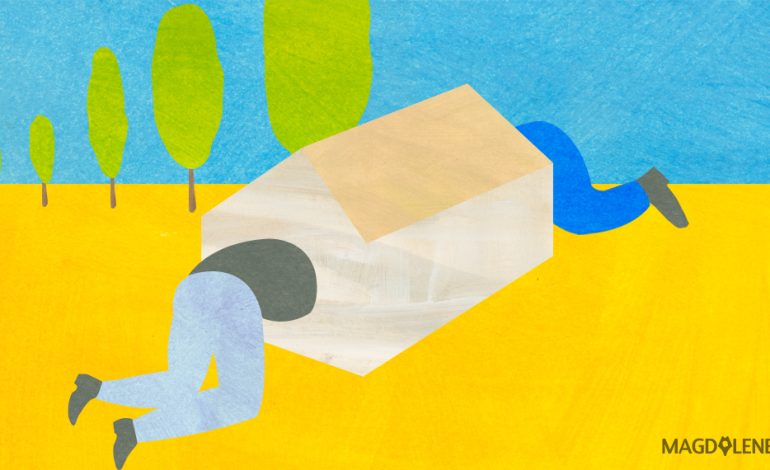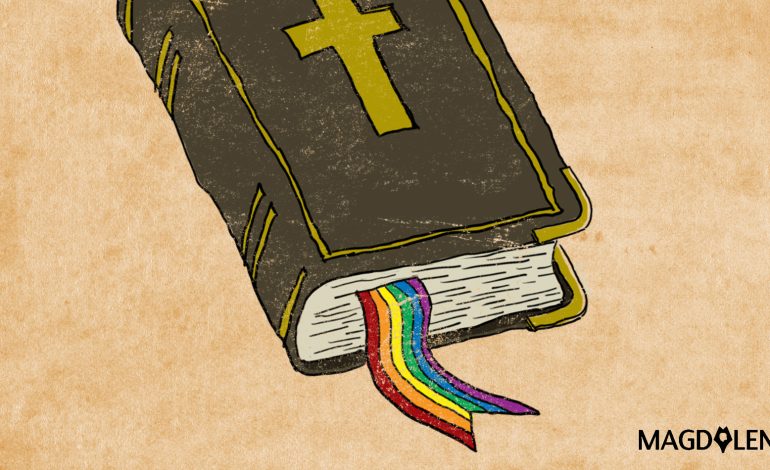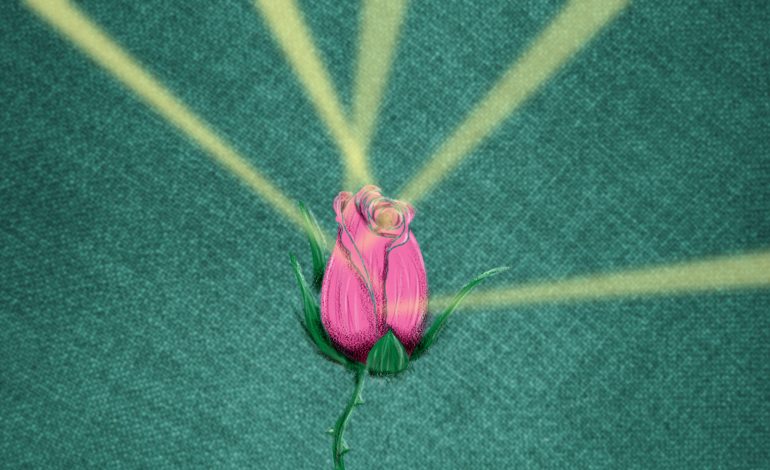Being Gay and Indonesian: Appropriated but Marginalized


“Everyone wants to be black until it’s time to be black.”
This statement has been quoted, retweeted, and shared plethorically since the late 2014 or the beginning of 2015, when the shooting of Michael Brown was talked about every social media-second of the day. Brown, an 18-year-old black teenager was found dead in the hands of Darren Wilson, a white Ferguson police who fatally shot him after the former reportedly robbed a convenience store.
One of the most popular elaborations on the statement came from a Twitter user called @locoernesto who tweeted: “I have yet to hear anything about #Ferguson from Miley or Bieber. Katy? Iggy? Everyone wants to be black until it’s time to be black”.
Posted on Aug. 14, 2014, the tweet called out the hypocrisy of celebrities who had capitalized on black culture throughout their career. They rely on cultural appropriation to push their way to the top of the charts, while overlooking discussions of race with smarm or vagueness because anything beyond such stolen yet hit-generating exterior may not be beneficial to them.
As an outsider witnessing this racial tension through the media I tried to understand what the black community felt towards these artists’ shut lips – their twerked backs and cornrowed hairdos aside – when it comes to police brutality against the African Americans. Every think piece I’ve read on the issue made me grown weary of these celebrities. They built a marketing positioning upon the premise of celebrating black culture, but then their idea of giving credit to black people is by treating them as exotic commodities whose social struggles aren’t worth coexisting with their FGD-approved pop tunes.
I got the urgency of caring about the trouble with appropriation, but I never realized how closely the issue hit home until I related it to my own experience of being a marginalized individual. As a gay man living in Indonesia, the way my so-called tolerant milieu has been treating my being so far is not that different from what white entertainment’s casual racism has done to black people.
The gay appropriation
Indonesia’s stance on LGBTIQ has always been blurry since the country reclaimed its democracy, to say the least. Heterosexual and cisgender people acknowledge us, but do not thoroughly – or in the case of conservatives, won’t ever – accept us. This is a bold statement to make on my part considering the fact that I had come out to several people, and occasionally demonstrated my queerness. These same people appear comfortable with my camp and conversations about gay sex.
But when the topic of my rights as a gay person was brought up, their reaction differs.
“Well, if gay couples get married, what’s going to happen to reproduction? You won’t have an heir or something,” a friend of mine once said responding to my vehement belief in gay marriage.
Taking into account how overpopulated Indonesia is and the country’s decreasing education index there’s no better response to such argument than an eye-rolling. As if by allowing gay marriage, all of a sudden everyone will come out as gay and straight marriage will face extinction.
One can say what they want about those hosts’ true sexuality or argue about why they’re choosing to remain in the glass closet, but one thing is for sure, they’re contributing to the notion that a male’s feminine traits are meant to be laughed at.
Gay marriage? No. Gay sex? Judging by how interested they are in my carnal knowledge, I couldn’t help but wonder if they wish they weren’t straight.
“I never thought that gays were able to do any other sex positions but the doggy style.”
“So how many anal intercourses have you had to get rid of that ‘pooping’ feeling?”
These are the remarks and questions I have had to respond to ever since my identity as a sexually active gay man was revealed. But every time I ended the conversation with a wishful thinking that someday I’ll find someone I can settle down with, I’ll be told: “Well, don’t you want to have a wife someday?” Or “Go get married in Netherlands or the U.S. You will never be able to do so here.” All by the same people who had just expressed their “progressive” curiosity.
Aside from sex, my peers seem to enjoy me imitating Naomi Campbell’s runway walk. As I strutted down the hallways of my office on lunch break, they welcomed me with awe-struck praises and applause. But once the fashion show was over and we were back to talking about social phenomena, including my fears of being persecuted by the extremists and law enforcement for having sex with a man or being in a gay club, they simply dismissed every single word that came out of my mouth as exaggeration.
Looking at the bigger picture, it’s pretty evident that gay act, for a lack of better term, sells well – in addition to lowbrow entertainment – in Indonesia’s TV shows. There is a slew of hosts who behave campily and engage in queer baiting through acts in which they display homoerotic tensions with their co-host or guest stars, only to be made fun of by the entire production crew and audience. The audience’s ensuing hysterics actually unveils implicit homophobia.
One can say what they want about those hosts’ true sexuality or argue about why they’re choosing to remain in the glass closet, but one thing is for sure, they’re contributing to the notion that a male’s feminine traits are meant to be laughed at. There’s no denying that the audience doesn’t reject the evidence that two males can kiss each other, but to them, such action is done for nothing but hilarity.
My friends from the privileged majority see my gay stereotypes as amusement, but only when served without a side of social consciousness.
This country is familiar with LGBTIQ-associated behavior, mannerism and roles. Its people would even take great pleasures in witnessing them. Viewers of those mass-market catastrophes we call TV shows and some of my friends serve as a testament to this snail-like progress. However, these people would only appreciate us, the others, if our purpose to live is to gratify them.
In a way, the whole backhandedness of such appreciation reminds me of — dare I say it — minstrelsy. As a demeaning, racially charged performance, minstrel shows ridiculed African-Americans by reducing them to a bunch of dim-witted, slothful, clown-like, and superstitious caricatures because it was what white audiences found to be entertaining.
My friends from the privileged majority see my gay stereotypes as amusement, but only when served without a side of social consciousness. To them, we (gay men) only matter if we project fun, brightness, and liveliness, which is what being gay, etymologically speaking, was all about. They forgot that the word “gay” had endured transformations since the late 19th century and, as it stands now, the rainbow that we cherish in our hearts wouldn’t even exist without decades of resistance.
Just because some gay men enjoy sex doesn’t mean our aim for companionship can only end up in bed-hopping, hence legal marriage is but a dream. Just because we are comfortable in our lukewarm progressive bubble, in which we are privileged to be gay only to the extent that we’re not concerned with our rights, doesn’t mean we are safe from persecution, jail, or even death. And just because we are gay doesn’t mean our gayness would only cater to your laughter and commendation. The approval you express means nothing if – to borrow the idea from the quote at the beginning of this piece – “you only want to be friends with the gays until it’s time to acknowledge the rights of the gays”.
Rey Aksara is a media planning manager by day and a restless writer by night whose life stories often play out like the scenes in a mumblecore film. As someone who aspires to be a New Yorker/international affairs professional someday, this critical observer of aural and visual tour-de-force – be it in the form of music, cinema, or fashion – is currently working on getting a scholarship at Columbia University’s School of International and Public Affairs. He looks forward to learning more about Human Rights and Humanitarian Policy from which, hopefully, he can turn his regular exercise in empathy into life-changing actions.
*Illustration by Karina Tungari






















